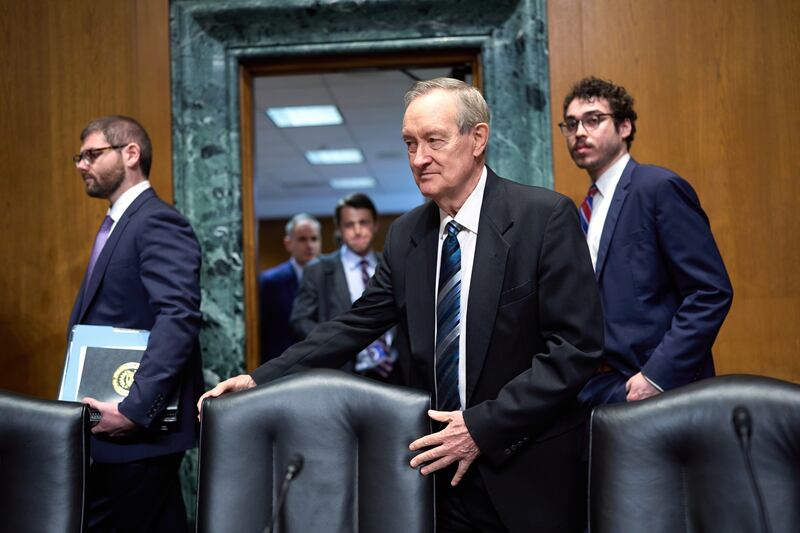WASHINGTON — Senate Republican leaders are in crunch time as they attempt to get all corners of their party to agree on key provisions of President Donald Trump’s signature tax bill.
The Senate Finance Committee released its long-awaited tax portion of the reconciliation bill on Monday, making a number of changes to the version passed by their House colleagues last month. However, those changes have not been met with open arms by several in the GOP conference — which could threaten its passage if Senate leaders bring it to the floor for a vote next week.
One of the thorniest issues tucked into the latest iteration is a proposal to lower the Medicaid provider tax to 3.5%, far below the current 6% tax. That has raised concerns among some lawmakers from states they say rely on that tax to provide health coverage.
Medicaid provider taxes are taxes placed by states on medical providers like hospitals and clinics that then boost reimbursement from the federal government.
Sen. Susan Collins, R-Maine, has been a vocal opponent to paring back the tax, although she declined to elaborate on her current stance. However, Sen. Josh Hawley, R-Mo., expressed his frustration with the proposal, arguing it would disadvantage rural hospitals.

“I’ve talked to our leadership constantly about this. And I was told, we’ve got a fix on the provider tax issue, we’re gonna help rural hospitals,” Hawley told reporters on Tuesday. “There’s nothing in here for rural hospitals. In fact, what they’re doing is lowering the provider tax to make it even worse.”
It’s not clear if that language will be amended before it’s voted on. Senate Finance Chair Mike Crapo, R-Idaho, said on Tuesday they are “vetting” the text.
Dr. Mehmet Oz, the administrator for the Centers for Medicare and Medicaid Services, met with Senate Republicans during their weekly lunch on Tuesday to assuage any concerns on proposed cuts. When asked if there is any chance Republicans will change language related to the provider tax, Oz brushed off those concerns.
“Well, the details of the language are up to the leadership, but the specifics, the framework of addressing the legalized money laundering with state-directed payments and provider taxes must be in this bill,” Oz said. “It should be in this bill.”
Vice President JD Vance also attended the lunch, telling reporters they would “work through” any concerns with the current language related to Medicaid.
“If we can’t address that concern in your preferred way, is there another way that we can fix it,” Vance told reporters. “That’s just part of the legislative process”
Meanwhile, Sen. Lisa Murkowski, R-Alaska, predicted: “I don’t think it’s going to stay in this form.”
One of the other politically potent issues tucked into the reconciliation bill is the proposed expansion of federal deductions for state and local taxes paid, also known as SALT.
While House Republicans proposed increasing the cap to $40,000 — with some income limits — the Senate lowered that number to just $10,000, which is the cap currently in place. That provision has already been rejected by the SALT Caucus in the House, which has enough lawmakers to tank the bill if they don’t get their requested amount.
Crapo said those provisions would continue to be worked out in the Senate and the House, acknowledging “that’s a very big piece, obviously.”
“We will work it out,” Crapo said.
Republican leaders must also deal with Sen. Rand Paul, R-Ky., who has said he would vote against the package so long as it contains language raising the debt ceiling. The Senate version includes language to raise the debt limit to $5 trillion, even higher than the $4 trillion ceiling proposed by the House.
“We roll around to 2026 elections, what are they going to say? ‘Oh Democrats, you know, they’re for borrow and spend,’” Paul said on Tuesday. “But now the Republicans will have joined the Democrats in being for borrow and spend.”

The text release starts the clock for senators to finalize the package, get it approved by the Senate parliamentarian, and vote on the measure before the end of next week to meet Republicans’ self-imposed deadline of July 4. The parliamentary process could take several days as each provision must be reviewed by the Senate adviser to ensure they adhere to the strict rules of reconciliation.
Once the package passes the Senate, it will then be returned to the House for consideration. From there, Republicans will likely need to convene what is known as a conference committee between House and Senate leaders to negotiate a compromise package in order to avoid a legislative tennis match.


